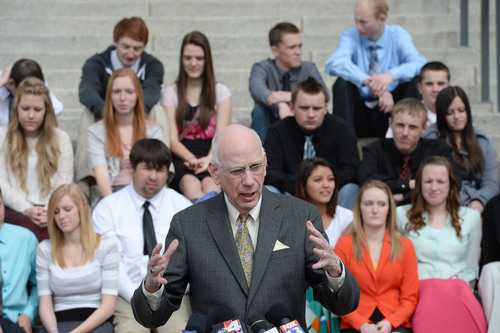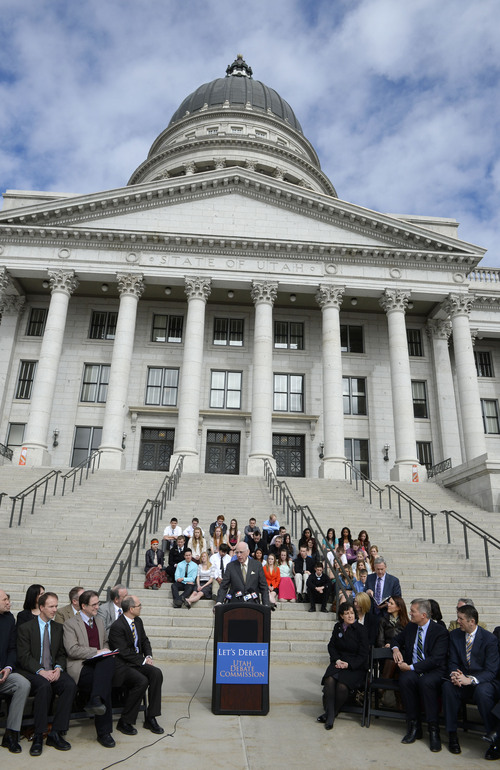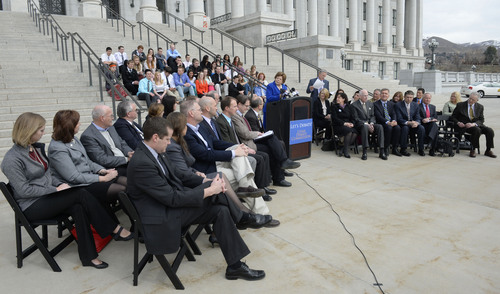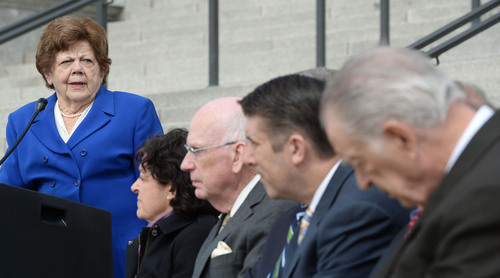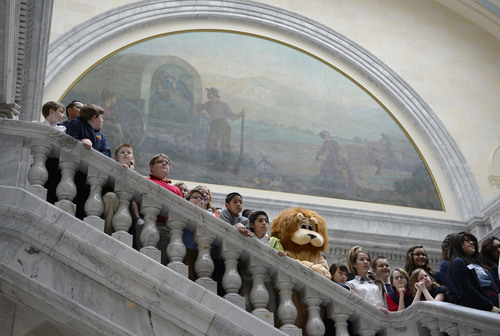This is an archived article that was published on sltrib.com in 2014, and information in the article may be outdated. It is provided only for personal research purposes and may not be reprinted.
In a time of big money politics with public participation on the wane, educators, news media and some old guard politicians have come together in hopes of enlightening and engaging Utah voters.
On Monday, they announced the creation of the Utah Debate Commission, a nonpartisan organization that will plan, stage and televise political debates for federal and statewide offices every election cycle. Organizers say the commission will provide an ordered process for debates and give equal opportunities to qualified candidates to get their message to voters.
"It's our hope that candidates, parties and voters will help create a culture of debating in Utah that will enhance the electoral process for all," said former Gov. Olene Walker, a Republican. "We ask voters to encourage candidates to come together with their opponents in a debate setting and allow voters to hear their views on the pressing issues facing our state."
As with Count My Vote — a drive to establish direct primaries — the creation of the Utah Debate Commission seeks to engage voters in the democratic process at a time when special interests can dominate elections.
"It's our responsibility to see that candidates that have been ignored get attention in an orderly fashion," said commission co-chairman Bob Bennett, a former Republican U.S. senator.
"We want the voters to get to see everyone," said Scott Howell, the other co-chairman and a former Democratic state senator.
The commission's 17-member board boasts representatives of the state's major universities and news outlets, including Terry Orme, editor and publisher of The Salt Lake Tribune. The newspaper will live-stream debates on its website, http://www.sltrib.com, as well as cover debates in print, he said.
Renai Bodley, news director at FOX 13, said her television station and others in Salt Lake City have pledged to cover one-hour political debates at no charge.
The commission was born from discussions between educators from six Utah universities, said Richard Davis, professor of political science at Brigham Young University. Organizers determined to do for Utah political races what the Commission on Presidential Debates does every four years for candidates seeking the White House — host debates.
"Is the Utah governor's race less important?" he asked rhetorically. "We don't think so."
Davis announced Monday the debate schedule for this fall's election. It includes debates for all four congressional seats and the Utah attorney general's office.
James Evans, chairman of the Utah Republican Party, said he remained unclear on the details of the commission's plans but wanted assurances the debates would be fair and nonpartisan. He pointed to the second presidential debate between President Barack Obama and Mitt Romney and said moderator Candy Crowley was unfair. In that debate, Crowley told Romney that the president had, in fact, labeled the Sept. 11, 2012, attack on the U.S. Embassy in Benghazi, Libya, as an act of terror the day after it occurred.
"We're waiting for firm definitions before we will be on board," he said.
Anna Thompson, spokeswoman for the Utah Democratic Party, said she welcomed the debates.
"Any opportunity for voters to hear from candidates is a chance for us to show that Utah Democrats are in line with Utah voters."
csmart@sltrib.com Fall 2014 debate schedule
Ist Congressional District — Sept. 23 at Weber State University
2nd Congressional District — Sept. 25 at Southern Utah University
3rd Congressional District — Oct. 7 at Utah Valley University
Utah Attorney General — Oct. 9 at Brigham Young University
4th Congressional District — Oct. 14 at the University of Utah


